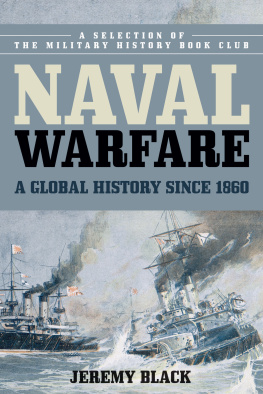Jeremy Black is Professor of History, University of Exeter. Graduating from Cambridge with a starred first, he did graduate work at Oxford, before teaching at Durham from 1980 to 1995, eventually as Professor, and then moving to Exeter. His books include War and the World, 14502000 , The Age of Total War and Naval Power .
CHAPTER 5
1917
When one considers the millions under arms 30 or 40 thousand prisoners seems nothing very colossal.
Arthur Child-Villiers on the British offensive at Arras.
The unexpected and the failure of planning were both much in evidence in 1917. The collapse of Tsarist rule in Russia, the subsequent breakdown of the Russian war effort and the Bolshevik (Communist) coup in Petrograd (St Petersburg), led to a transformation of the war. There had been much talk of the need to help Russia in order to prevent its collapse, but, when the latter occurred, its scale and speed took most by surprise. Surprise was less the case with American entry into the war, as that was an obvious consequence of the German decision to resume unrestricted submarine warfare. However, the consequences of the latter were not as anticipated by the Germans.
If these developments provided key parameters for the events of the year, demonstrating anew the close links between politics and war, they scarcely exhausted the list of the unexpected, nor of failed plans. Nor did they provide the sole themes for the year. Three others were offered by the increasing pressure of the conflict on the combatants, the related sense that the cataclysmic struggle being waged was a total measure of peoples, and, conversely, significant improvements in fighting technique and weaponry.
Moreover, the narrative of the war, always complex, became increasingly fractured as the toll on political stability increased, and this also ensured that there was fighting that in no way matched that on the front lines. In February, a Liberal rebellion against the rigged Cuban election of 1916 was firmly repressed by Marco Menocel, the Conservative president. In December 1917, the government of Portugal, which, under British pressure had entered the war on the Allied side that year, was overthrown by a Revolutionary Committee under Major Sidonio Paes. The confused nature of the confrontation in Lisbon was captured by Major-General Nathaniel Barnardiston, the Chief of the British Military Mission: the fleet got to work and the field pieces replied but were almost all short. I only saw one go over and none apparently anywhere near There was intermittent rifle fire all night as rioters were looting shops etc.
In Spain, neutrality did not prevent an increasingly disturbed situation in which pressure to intervene on the Allied side fed into political instability. The army suppressed a General Strike called by the Socialists on 13 August, while, in October, an army ultimatum forced a change in government. The inflation and spread of trade unionism seen in Spain had an impact more generally. In Greece in 1917, King Constantine I was deposed with Allied support in June and the country, under his rival the pro-Allied Prime Minister Eleutherios Venizelos, declared war on Germany. The British and French attack on Athens is little known.
Developments in Portugal and Spain reflected a sense of chaos and uncertainty that owed much to the Russian Revolution. Russia was dealt a knock-out blow by the combination of defeat at German hands and the failure of its state to respond adequately, but the Germans, ironically instead, planned a knock-out blow against Britain by means of unrestricted submarine warfare. Having failed to drive France from the war at Verdun, and experienced the lengthy and damaging British attack in the Somme offensive, the Germans sought to force Britain from the war by resuming attempts to destroy its supply system. There was a parallel with the invasion of France via Belgium in 1914, in that the strong risk that a major power would enter the war as a result, Britain in 1914 and America in 1917, was disregarded on the grounds that success could be obtained as a result of the German attack. In 1917, however, the Germans, unlike in 1914, had had plentiful warnings as a result of their earlier use of unrestricted submarine warfare. There was also a failure of planning as anticipated outcomes from the submarine assault did not arise, and the timetables of success miscarried.
Yet, this account assumes a rationalist balance of risks and opportunities which ignores the extent to which the decision to turn to unrestricted submarine warfare reflected an ideology of total war and a powerful Anglophobia based on nationalist right-wing circles, for example the Pan German League, that saw British liberalism and capitalism as a threat to German culture. These ideas were given political bite by the argument that the German government, notably the Chancellor, Bethmann-Hollweg, was defeatist and interested in a compromise peace, and that support for unrestricted warfare was a sign of, and security for, nationalist commitment. Indeed, Tirpitz, who had links with such circles, was allowed to resign in March 1916 because his support for unrestricted submarine warfare had led him to quarrel with the Chancellor and to challenge the position of the Kaiser. The following month, an American protest led Wilhelm II to order the suspension of the permission given that February for the sinking without warning of armed freighters; but not of passenger ships.
On 31 January 1917, however, Germany announced, and on 2 February resumed, unconditional submarine warfare, which led to America breaking diplomatic links the next day and declaring war on Germany (but not its allies) on 6 April. Congress had approved the decision, although six senators and 50 congressmen opposed it. The German military leadership, increasingly politically influential, was unsympathetic to American moralizing, while, as in 1941, there was also the view that America was already helping the British and French war effort as much as it could commercially. Moreover, there was a conviction that Britain could be driven out of the war rapidly by heavy sinkings of merchantmen: a belief that the submarines could achieve much, and that this achievement would have an obvious consequence. It was claimed that the British would sue for peace on 1 August 1917. Furthermore, many German submarine enthusiasts assumed that their force would be able to impede the movement of American troops to Europe very seriously and, more generally, there was a failure to appreciate American strength. On 31 January 1917, Eduard von Capelle, the German Naval Minister, unwisely told the budget committee of the Reichstag that, from a military point of view, America was as nothing.
In 1914, there was active hostility in America to the idea of participation in the European war. It was seen as alien to American interests and antipathetic to her ideology, although the liberal credentials of American policy were rather tarnished by interventions in Mexico in 1914 and 1916, Haiti in 1915 and the Dominican Republic in 1916. These interventions reflected imperialist assumptions, but not a drive for territorial expansion. The unrestricted submarine warfare that sank American ships (and also violated international law) led to a major shift in attitudes in which Americans became persuaded of the dangerous consequences of German strength and ambitions, and did so in a highly moralized form that encouraged large-scale commitment. Thus, America constructed national interest in terms of the freedom of international trade from unrestricted submarine warfare.
Germanys crass wartime diplomacy exacerbated the situation, notably an apparent willingness to divert American strength by encouraging Mexican opposition, including revanche for the major losses suffered in the Mexican-American War of 184648. The Americans were made aware of this when the British intercepted a telegram to the German Ambassador in Mexico from Arthur Zimmermann, the Foreign Minister. The logic of this apparently bizarre move was pre-emptive: the Germans wished to distract American energies from war in Europe. American sensitivity about German links with unstable Mexico was acute: later that year, the San Francisco Chronicle claimed (incorrectly) that German submarines were being constructed at a secret base in Mexico.

















